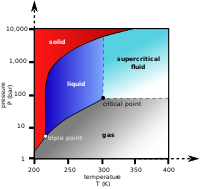
Photo from wikipedia
As global fossil reserves are abruptly diminishing, there is a great need for bioenergy. Renewable and sustainable bioenergy products such as biofuels could fulfill the global energy demand, while minimizing… Click to show full abstract
As global fossil reserves are abruptly diminishing, there is a great need for bioenergy. Renewable and sustainable bioenergy products such as biofuels could fulfill the global energy demand, while minimizing global warming. Next-generation biofuels produced by engineered microorganisms are economical and do not rely on edible resources. The ideal biofuels are alcohols and n-alkanes, as they mimic the molecules in fossil fuels and possess high energy densities. Alcohols and n-alkane hydrocarbons (C2 to C18) have been produced using engineered microorganisms. However, it is difficult to optimize the complex metabolic networks in engineered microorganisms to obtain these valuable bio-hydrocarbons in high yields. Metabolic engineering results in drastic and adverse cellular changes that minimize production yield in microbes. Here, we provide an overview of the progress in next-generation biofuel (alcohols and n-alkanes) production in various engineered microorganisms and discuss the latest tools for strain development that improve biofuel production.
Journal Title: Energies
Year Published: 2018
Link to full text (if available)
Share on Social Media: Sign Up to like & get
recommendations!